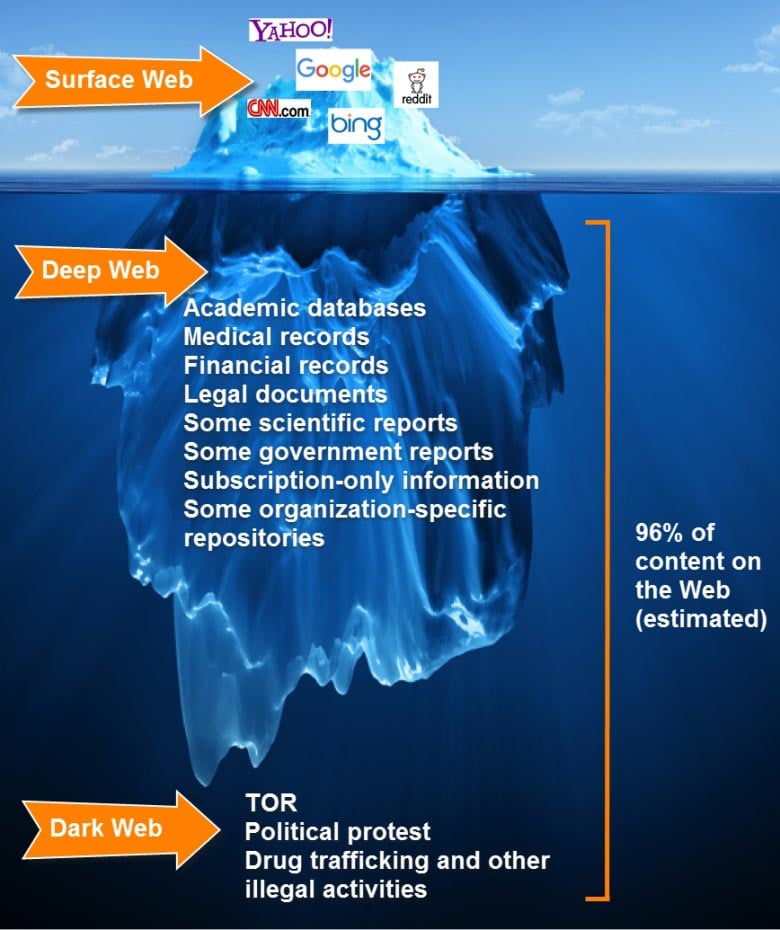I learned so much from theme three, especially how the web works and what exactly the “deep web” entails. Before this theme’s readings, I really did not understand the deep web and had only heard horror stories about the “dark web”. In fact I think I developed an irrational fear of the dark web, so much so that the mere thought of researching it felt unsafe! Yes I knew that the classic search engines like google, yahoo or Bing only give a very narrow result and that those results are biased and based on your past searches and web history. But, my mind was blown when I realized that the deep web accounted for 96% of what is available on the web! There is so much information out there that it is overwhelming.
I found this infographic really amazing for explaining the deep web vs the dark web and plan on sharing it with my middle school students:

Image from:. Inside the dark web: What every parent needs to know. The Mac Security Blog. https://www.intego.com/mac-security-blog/inside-the-dark-web-what-every-parent-needs-to-know/
I think the sheer vastness of the internet highlights the importance of teaching critical thinking skills. We cannot control all of the internet and the information it contains. But, we can teach kids how to decipher it and make wise choices. That being said I don’t think I am comfortable yet about teaching the deep web/dark web to kids. I teach in a middle school and I think they are way too immature yet. I could just see them going home and saying, “Ms. Clarke taught us all about the dark web today!” or worse, them learning how to conceal their search history from their parents and looking up inappropriate things. I think one way to start this conversation with kids is just to let them know that the deep web is very vast and that their searches on typical search engines only uncover a small fraction of what is out there. I did find this website that lists a lot of search engines on the deep web that may be worth checking out or demonstrating with kids who are ready : https://deepweblibrary.wordpress.com/ . I think that by focusing on few sites teachers are able to really develop skills around navigating the deep web and work on critical thinking skills while being ale to monitor the kids and their safety.
My mind was further blown when I realized that we are already accessing and using the deep web on a daily basis! Many search engines and sites provided by our district are subscriptions that staff or students need to log in to are part of the deep web. As Fisher states, “it’s not always easy to find what you’re looking for with a standard search engine, especially if you’re in search of something a bit complicated or obscure”. Perhaps that’s why, even though we teach them not to, our students navigate to the free-citizen built online encyclopedias like Wikipedia. As Harris puts it, “[e]ven if you filter Wikipedia and its typically prominent results on Google, students will just use it at home” (26).

References:
Deep Web Library. (n.d.). Retrieved March 4, 2022, from https://deepweblibrary.wordpress.com/
Fisher, Tim. “The Invisible Web: What It Is & How to Find It.” Lifewire, 19 July 2019, https://www.lifewire.com/invisible-web-how-to-find-it-3482490.
Harris, Chris. “Can We Make Peace with Wikipedia?” School Library Journal, vol. 53, no. 6, June 2007, p. 26.
Vrijenhoek, J. (2017, July 5). Inside the dark web: What every parent needs to know. The Mac Security Blog. Retrieved March 4, 2022, from https://www.intego.com/mac-security-blog/inside-the-dark-web-what-every-parent-needs-to-know/

Hi Brittany,
I like how you framed your reflection on this theme around your experiences with teaching elementary-aged students. I agree, it is not always easy to know where to start them off with some information. I find it especially hard when you have a class at such a wide range of maturity and technical skill levels. Thank you for sharing the web page with deep web links. I have bookmarked it for future reference. Like you, I have experienced a shift in perspective with regards to balancing print and digital resources, although perhaps in the other direction. I am starting to understand the value of including quality print reference materials in the collection. Thank you for sharing all of your ideas about it and helping me to see the other side of the coin!
-Keri